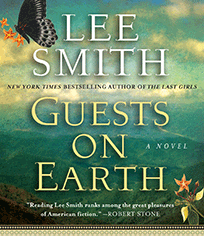 On first blush, Guests on Earth by Lee Smith (The Last Girls) bears resemblance to The Secret Life of Bees: A young girl, believing herself responsible for her mother’s death, leaves her home and finds herself among a group of women that soon become her second family. Even Emily Woo Zeller’s voice, while unaccented, has a soft lilt not incomparable to Jenna Lamia’s here.
On first blush, Guests on Earth by Lee Smith (The Last Girls) bears resemblance to The Secret Life of Bees: A young girl, believing herself responsible for her mother’s death, leaves her home and finds herself among a group of women that soon become her second family. Even Emily Woo Zeller’s voice, while unaccented, has a soft lilt not incomparable to Jenna Lamia’s here.
But there the resemblance ends, for this story is set decades earlier; the new home protagonist Evalina Toussaint finds is a home for the mentally ill; and the fight—although the women don’t ever necessarily express it that way—is not for black/white equality but a fight for their own lives as women of imagination, intelligence, and talent against the status quo (and outright abuse) of society, their husbands, and even themselves.
Evalina from an early age is a talented pianist; and a leitmotif of Guests on Earth is that instead of becoming the star soloist many others anticipated she instead settles in as an accompanist, in fact referring to herself repeatedly in different contexts as an accompanist. A better analogy would perhaps be “second fiddle.” And she is not unique in this position.
Zelda Fitzgerald, who famously was a serial patient and died in a tragic fire at the very real Highland Hospital where this story is set, becomes emblematic—the not endearing yet admired godmother—of this band of women, not all of whom are patients but whose lives are subjugated to those of their male counterparts or societal expectations.
Having majored in English and having grown up in St. Paul, Minnesota, I of course knew and read the writings of F. Scott Fitzgerald. But it’s only in this recent resurgence of interest in F. Scott and Zelda that I discovered the extent to which he plagiarized—or more bluntly simply outright stole—his wife’s writings and claimed them as his own work. There is even evidence to suggest (although Smith only brushes lightly against this here) that he strategized to have Zelda institutionalized. Not a pretty revised picture of this hometown hero.
Such a description of Guests on Earth may to this point suggest a dark novel and not an enjoyable listen, but that would be discounting the lyrical way Lee Smith writes it and Woo Zeller reads it. At heart, most of these women are to be admired in many ways, as colorful and beautiful as the butterflies and flowers that populate the grounds on which they live—even as we see that their delicate wings are beating in a confined space and as flowers they are trimmed and arranged and their lives consequently shortened in comparison to if they had been left simply to grown and bloom.
And not all the damaged souls are women. At the same institution we also meet Robert and Pan and an assortment of shell-shocked men, all of whom have also found that the role consigned to them by society is hard to bear.
Some patients do successfully leave Highland Hospital, in spite of or even because of the electroconvulsive therapy, insulin shock therapy, or drug-induced convulsive therapy administered there—all typical treatments of the era and even of today. This isn’t a story ala One Flew Over the Cuckoo’s Nest, of a monster staff intent on abuse; these are professionals applying the best-known treatments of their day in a kindly setting. But their administration here is without real patient consent, a fact made more disturbing in a story in which the line between true mental illness and societal norms regarding acceptable female behavior are at times blurred.
The final impression left by Smith’s novel is the one that begins it: the F. Scott Fitzgerald quote (although, at this point, one wonders to whom the credit is truly due) that perhaps we all, not just the insane, are in some ways “… merely guests on earth, eternal strangers carrying around broken decalogues that [we] cannot read.” Whether perhaps we’d be better off taking the first opportunity to smash and leave those decalogues entirely behind rather than struggle to read them remains the question.

No Comments so far ↓
There are no comments yet...Kick things off by filling out the form below.